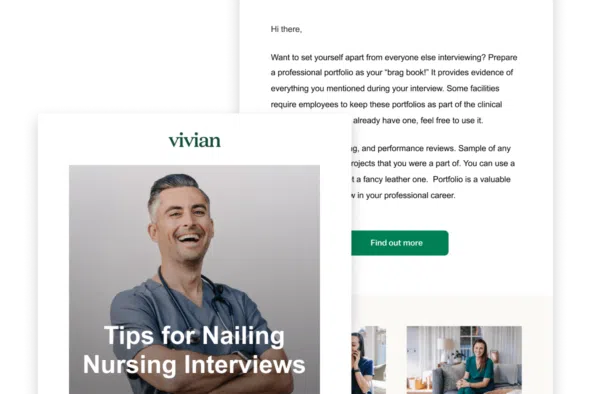Whether you’ve already lined up your first travel nursing job or you’re still considering your options, hitting the road on your first assignment is both exciting and a little nerve-wracking. After all, you’re moving to a new city, starting a new travel nurse job and meeting new people all at once, but only for a short period. That’s a lot of changes to get used to, especially knowing that you may be doing it all over again in a few months. Consider these 12 tips to lower your stress level and be better prepared before starting your first travel nursing job.
1. Pick a Place You Know
Packing to move to a new location for longer than the typical vacation often makes the first travel nursing job a bit daunting. To help you ease into this new lifestyle, pick a place that’s familiar to you. Choose a city where you have friends or family you can visit while you’re in the area. If this isn’t an option, choose a destination you’ve visited in the past so you’re already familiar with your new surroundings. Choosing places you already know can help calm your nerves as a first-timer, then you can branch out as you become a veteran traveler.
RELATED: Vivian’s Travel Guides
2. Ask Questions to Prevent Regrets
Your recruiter is there to help you and ensure you have a smooth transition into each new assignment. You’re understandably nervous and unsure when it’s your first assignment, so don’t be afraid to ask questions. Going into an assignment without knowing all the details could lead to regrets. You don’t want to start your travel nursing career on a sour note. Good things to ask about are the facility’s patient-to-nurse ratio, floating policy and where you’ll be expected to float, missed shift policy and details about the ancillary nursing personnel.
Don’t overlook questions about pay, such as the number of hours you’re expected to work weekly, whether the contract guarantees hours, the overtime rate for any hours worked over your contracted hours and the cost for benefits. If anything might be a deal-breaker for you, ask about it before you head out on your first travel nursing job.
3. Confirm Details in Advance
Although your travel nursing recruiter may be well-organized and helpful, it’s best to confirm the most important details yourself to be on the safe side. Lines of communication sometimes get crossed, or things may fall through the cracks. Few things will add more stress to your move than having something go haywire from the start. For instance, you don’t want to arrive at your short-term housing and be told it’s not quite ready or arrive at your new workplace, not knowing where to go or whom to ask to see if no one meets you at the designated place.
About a week before you’re scheduled to arrive, confirm your move-in date with the landlord or property management company, along with the utility setup with the appropriate entities. Get the name of your point of contact from your recruiter and reach out to confirm with them directly about exactly when and where you’re meeting and the best way to contact them should something go wrong.
4. Ensure Documents Are Current
Double-check that your RN licensure isn’t due to expire. If you have a multistate license issued by a state in the Enhanced Nurse Licensure Compact (eNLC) and are traveling to a state within the eNLC, you probably already know you’re good. If you applied for licensure by endorsement or a single-state license in the state you’re temporarily moving to, make sure all the paperwork has been submitted and the licensure is in place or will be before you arrive.
Also, check when any necessary professional certifications, such as Basic Life Support or Advanced Cardiac Life Support, expire to ensure you’re in compliance with the job. Depending on your specialty, you may also need certifications specific to this field. Other necessary documentation are your medical records, including a Statement of Fitness for Work following a physical exam completed within the last year, a negative TB/PPD test and immunization records. You must meet all the hospital or facility requirements before you arrive, so you can hit the ground running.
Bring all your documentation with you during orientation or your first day of work. Although you or your recruiter typically submit everything in advance, sometimes something ends up missing or the healthcare facility needs to verify that the original documents match the copies they received. You don’t want missing documentation to delay your start, which could jeopardize your contract.
5. Stay Organized Back Home
You don’t want to worry about anything back home while you’re away on your first travel nursing job. If you have a roommate, you won’t have to worry about securing your home or what to do with mail. But if you don’t, make sure you have a plan.
Find someone to take care of any home maintenance and keep an eye on your place while you’re away. If you have an alarm system, add a friend or family member as the contact person for the alarm company in case they receive a triggered alarm at your home. Submit a temporary stop or forward on your mail based on how long you’ll be away. Stop any newspapers, so they’re not piling up and telling burglars the home is empty.
6. Research Before You Go
Find out what you can about the area you’ll be staying in for the next 13 or so weeks. Go online for information about your new city to learn what you can before you arrive. Look up the public transportation site if you expect to use it for getting to and from work to learn the appropriate routes and schedules.
Visit the official city website to familiarize yourself with city happenings and other important things about your new home. Research local events and places to pursue the activities you enjoy during your downtime. For example, if you like to hike, compile a list of popular hiking trails in and around your new city. If you’re traveling with your family, look for parks, zoos and other family-friendly places for days off. Overall, try to get a sense of what your destination city does and doesn’t offer to decide if you’ll be happy while you’re there.
7. Download Helpful Apps for Travel Nurses
Look for the latest apps for travel nurses. Whether you want information on where to take your pet or meet other travel nurses, several helpful apps cover many aspects that help improve the travel nursing experience. One particularly helpful app for new travel nurses is PackPoint. This app helps you prepare for each new assignment with packing pointers to ensure you don’t pack too little or too much, organizing what you need based on your length of stay, the weather at your destination city and any planned leisure activities.
RELATED: 21 Best Apps for Nurses in 2022
8. Take a Bit of Home with You
Some travel nurses thrive on the adventure of traveling to new places, but it’s not uncommon to be a bit homesick on your first travel nursing job. Regardless of how exciting it is and how much you love your new city, no place is like home. Ease homesickness by bringing a little piece of home with you. Pack some framed photos of you with your family and friends to place around your temporary lodging. Make your short-term home more relaxing by bringing along a favorite blanket or a few favorite pillows and scented candles that remind you of home.
9. Arrive a Few Days Before Your First Shift
If possible, plan to move into your new place a few days before you’re scheduled to start work. Ease into your new surroundings by spending a day or two unpacking and getting to know your way around your new city. Find essential businesses like banks, grocery stores, restaurants, etc. Give yourself some time to unwind before gearing up for the new job.
The day before you’re due to start, go on a dry run to your new workplace so you know the route. Leave your temporary housing at the time you think you need to leave to arrive on time to work to see if there are any surprises on the morning commute. Learn where you should park and find where you’re supposed to report to the next day. If possible, ask to take a tour of the hospital to start getting your bearings before jumping straight into work.
RELATED: 16 Safety Tips for Traveling Alone
10. Go In with an Open Mind
You might be stepping outside your comfort zone by starting a travel nursing career. Try not to have too many preconceived notions. For instance, consider the places you want to visit, but be open to exploring new areas. Consider getting to know as many people as possible, not just the usual types you gravitate towards. Try new foods, activities and adventures in your new city to make the most of your new traveling lifestyle.
11. Stay in Contact with Your Recruiter
Hopefully, everything goes off without a hitch on your first travel nursing job. But if something isn’t what you expected, contact your recruiter immediately. A good recruiter will be with you every step of the way and available to help if something goes amiss. Keep lines of communication open to correct any issues that arise as soon as possible. Even if everything is going well, check in occasionally to let your recruiter know everything is fine.
12. Consider Your Next Placement
About halfway through your first travel assignment, you must decide what you want to do when your current assignment ends. You may extend the contract at your current location if it’s an option. If this isn’t possible or you don’t want to extend, it’s time to think about your next placement and when you want to start. Many travel nurses like to take a week or two off before starting their next assignment to give them some downtime and prepare for the next move. However, you may not be able to start exactly when you’d like, based on location or the healthcare facility’s agenda. Being flexible on where you’re willing to go and your start date can help avoid delays on your next assignment.
Enjoy Every Opportunity
Life as a travel nurse is a lot of things. It can be exciting, busy and a little stressful, but make sure you take time to enjoy the experience. Spend time exploring your new city and getting to know your co-workers. Go off the beaten path and find hidden gems in your temporary town. Make each experience memorable by collecting items that remind you of the places you’ve been, start a travel blog or put stars on a map. Most importantly, make the most of your time because time flies, and 13 weeks go by pretty fast. It might seem like you just got there, but soon you’ll be packing your bags and hitting the road again.
Whether you’re looking for your first travel nursing job or you’re an old pro, Vivian Health can help you find jobs that check all your boxes. Explore our travel nurse salary guide to learn where you can earn the most money and find top travel nurse jobs nationwide.







